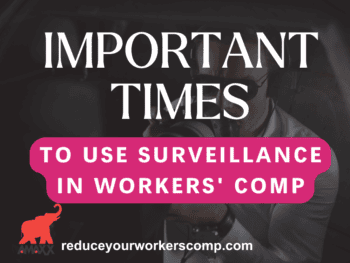Surveillance is an important tool in the claims investigation process. In order for it to be a success, there are a number of items to consider first. Failure to implement these policies can result in increased exposure or adverse determinations in your workers’ compensation case.
Selecting the Right Service Provider
Selecting the right service provider for surveillance is the most important component when using this method of discovery in a workers’ compensation case. This starts with careful research as to the qualifications of the provider and their understanding of licensing requirements in jurisdiction where the work will take place. It is also important that the provider conducts themselves in an ethical and honest manner. Failure to do so can result in civil liability and adverse determinations on the claim.
Important items to consider when selecting a service provider to perform this service include:
- Prior work experience of the investigators involved on the case. This includes military and law enforcement experience;
- History of proven results. This includes creative solutions to observing the individual in question and obtaining necessary information; and
- Understanding of budget constraints on the case. This includes a review of options for surveillance and other services they are able to perform.
Moving Beyond the Basics for a Successful Investigation
Not all surveillance efforts produce the results one expects when hiring a claims investigator. Claims handlers need to have realistic expectations and a willingness to understand results of a one-day observation of a claimant will likely not achieve desirable results. Approval of a private investigator’s services should come with the following understanding:
- Duration of surveillance. Surveillance experts are more likely to obtain results when their services are approved over a period of time. This includes the willingness to observe an individual’s movements for two to three days at a time. It should also include the expectation that services be provided for an entire daytime period, including observations into the evening.
- Understand the claimant’s schedule and habits. It is important to obtain and understand basic habits of the individual subject to surveillance. This includes known beforehand when the individual will be in public spaces and performing activities. This can include providing advance information to the investigator about the claimant’s medical appointments, IME appointments and other information about their activities of daily living.
- The time of year surveillance is conducted matters. People tend to be more active outside during the summer months. During the winter or colder periods of the year, it is normal for people to spend more time inside. When they are inside at a private residence or location, observing the subject and documenting their activities is impossible.
Information is KEY!
The more information a claims handler can gather about the claimant will assist in any surveillance investigation. This can include searches of known databases concerning hunting or other recreational licenses, properties such as cabins they may own and knowledge of their interests or favorite social events. Searches of social media are necessary. Keep in mind that all background searches must be done in an ethical manner and consistent with rules of professional conduct. A responsible member of a claims management team should never enlist the assistance of a friend or family member to serve as a “straw man” for various fact gathering activities on a claim.
Conclusions
Surveillance is an important and necessary component in claims investigation in certain cases. When conducting these activities through the assistance of a service provider, it is important to set reasonable expectations and work with professionals who know what they are doing.
Author Michael Stack, Principal, COMPClub, Amaxx LLC. He is an expert in workers compensation cost containment systems and helps employers reduce their work comp costs by 20% to 50%. He works as a consultant to large and mid-market clients, is co-author of Your Ultimate Guide To Mastering Workers Comp Costs, a comprehensive step-by-step manual of cost containment strategies based on hands-on field experience, and is founder of COMPClub, an exclusive member training program on workers compensation cost containment best practices. Through these platforms he is in the trenches on a working together with clients to implement and define best practices, which allows him to continuously be at the forefront of innovation and thought leadership in workers’ compensation cost containment. Contact: mstack@reduceyourworkerscomp.com.
©2016 Amaxx LLC. All rights reserved under International Copyright Law.
Do not use this information without independent verification. All state laws vary. You should consult with your insurance broker, attorney, or qualified professional.

























